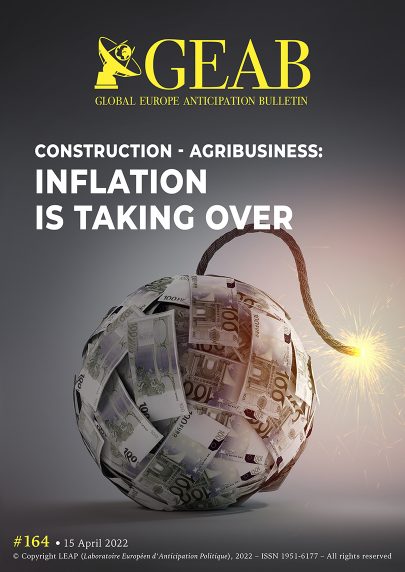GEAB 164
The four pillars of food security (availability, access, use and stability) are currently being shattered by the global situation (explained in detail below) and soon, we will be paying more for just about everything. Whether it comes to eating in or out, as all food prices are predicted to increase: foodflation[1] (food prices bubble) is not only impossible to avoid in 2022, but is also as contagious and sticky as a coronavirus.
Foodflation is knocking on Planet Earth’s door (the general context)
Our world has already faced severe crises simultaneously for centuries, the difference these days is that some of the challenges are taking apocalyptic forms because of the inherent virality of the internet and the omnipresent voice of the media in our lives.[2] While the big banks and financial authorities pretended that the financial shock of 2009 was manageable and took advantage of the collective euphoria of 2015-2016 to share their losses with everyone around (bank capital infusions included[3]), an unprecedented global pandemic occurred 4 years later, and the financial crisis has returned to our lives with supply difficulties (due to economic dependence on Asian imports, international freight congestion which should have improved by the end of 2021 but did not,[4] maritime labour shortage, truck drivers’ strike…), and also soaring raw material prices[5] and oil shortage risks. But when the East sneezes, the West already smells a cold and, notwithstanding the health, security and humanitarian crises, the energy and food risks are now breathing down our neck due to the interdependent nature of the globalised multipolar world we live in.[6] That is why the mirage of the “under-control-crisis” has vanished for good with the onset of the war in Ukraine, already raising the stakes to another level, influencing the market for basic agri-food products: shortage of wheat,[7] corn,[8] meat,[9] seeds, fertilisers,[10] (a few wisps of hope are to be found in Africa, surprise![11]). We remind you that in 2019, more than a quarter of the world’s wheat exports came from Ukraine and Russia, a fifth of the world’s corn and barley too. These two countries are the source of almost two-thirds of traded sunflower oil, with Ukraine alone accounting for almost half of the world’s exports.
Login

It is not a bipolar world that will result from the current war between the West and Russia, but the collapse of 500 years of Eurocentric global civilisation, at the [...]
The economic scissors are closing in on the global construction sector. The good old economic model based, to a very large extent, on new construction will soon no longer be [...]
In these times of crisis, it is difficult to follow a calendar of the future, as international and national agendas are so overwhelmed by fresh news. On the one hand, [...]
Bitcoin & co continues to grow // Gold: Big uncertainties are favouring historical solutions // Property prices: Amsterdam, Paris, Stockholm, Zurich, Munich, Frankfurt at the end of the line // [...]

Comments